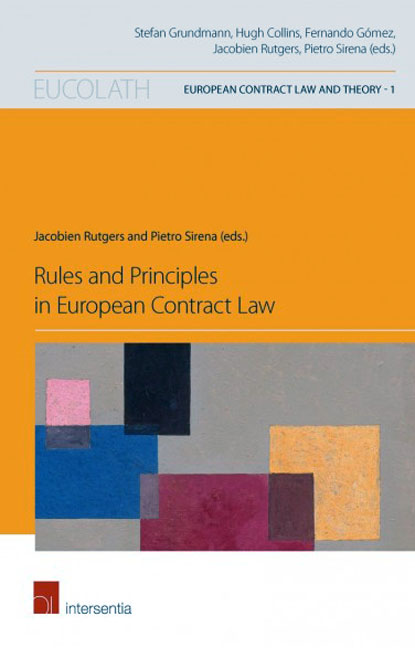Book contents
- Frontmatter
- Contents
- Table of Cases
- List of Authors
- Introduction
- Principles versus Rules in the Emerging European Contract Law
- The ECJ and General Principles Derived from the Acquis Communautaire
- The Principle of Effectiveness and EU Contract Law
- The Principle of Proportionality and European Contract Law
- ‘General Principles’ and ‘Underlying Principles’ in the Proposed Common European Sales Law and their Role in its Interpretation
- Contractual Autonomy and European Private Law
- Good Faith and Reasonableness in European Contract Law
- Benefits to the Defendant as a Measure for Relief: Toward a Specific Rule in European Contract Law?
‘General Principles’ and ‘Underlying Principles’ in the Proposed Common European Sales Law and their Role in its Interpretation
Published online by Cambridge University Press: 28 November 2017
- Frontmatter
- Contents
- Table of Cases
- List of Authors
- Introduction
- Principles versus Rules in the Emerging European Contract Law
- The ECJ and General Principles Derived from the Acquis Communautaire
- The Principle of Effectiveness and EU Contract Law
- The Principle of Proportionality and European Contract Law
- ‘General Principles’ and ‘Underlying Principles’ in the Proposed Common European Sales Law and their Role in its Interpretation
- Contractual Autonomy and European Private Law
- Good Faith and Reasonableness in European Contract Law
- Benefits to the Defendant as a Measure for Relief: Toward a Specific Rule in European Contract Law?
Summary
European lawyers have frequent and important recourse to the language of principle in their exposition and development of the law (EU or national) and this has been fully reflected in the discussions on European contract law. In this chapter, I will note the differing use of principles in the course of settling the Draft Common Frame of Reference (DCFR) and then look in more detail at the role of principles in the proposed Common European Sales Law (CESL), which distinguishes between ‘general principles’ and ‘underlying principles’. As will be seen, ‘principles’ have a very important role in the CESL, not least as regards to its interpretation and the settling of issues within its scope but unsettled by its provisions.
THE EVOLUTION OF ‘PRINCIPLES’ IN THE DCFR
The identification of ‘common’ or ‘fundamental principles’ was a central element in the Commission's communications on the development of European contract law in the first decade of the present century and their idea of constructing a Common Frame of Reference (CFR) for European contract law. At this stage, the Commission saw freedom of contract as the proper starting-point for constructing the model rules. In the Commission's view, ‘contractual freedom should be the guiding principle; restrictions should only be foreseen where this could be justified with good reasons.’ This concern for principle was reflected in the task entrusted to the authors of the DCFR by the Commission, who were asked to construct ‘principles, definitions and model rules’ of European private law. The changing way in which the authors of the DCFR interpreted this aspect of their remit is worth noting given that it casts some light on the treatment of principles proposed in the CESL.
In the first version of the DCFR published in 2008, the authors of its Introduction interpreted the phrase ‘fundamental principles’ used by the Commission ‘to denote essentially abstract basic values’.
- Type
- Chapter
- Information
- Rules and Principles in European Contract Law , pp. 99 - 122Publisher: IntersentiaPrint publication year: 2015

